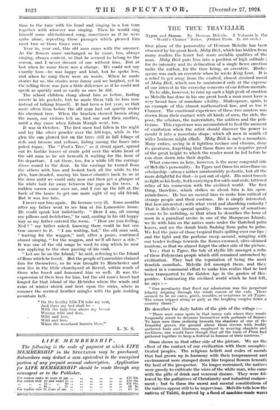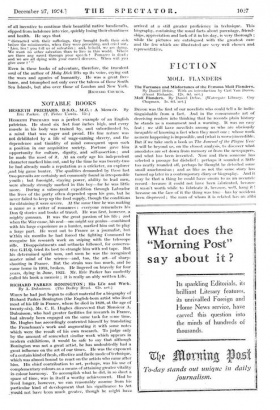THE TRUE TRAVELLER
ONE phase of the personality of Herman Melville. has been obscured by his great book, Moby Dick, which has hidden from inany readers the lesser but more sociable qualities of the man. Moby Dick puts him into a position of high solitude ; for its intensity and its delineation of a single fierce emotion make the author, for the time being, an eccentric. Shake- speare was such an eccentric when he wrote King Lear. It is a relief to get away from the exalted, almost strained mood of Moby Dick, which can be maintained only at the expense of our interest in the everyday concerns of our fellow-mortals.
To be able, however, to raise up such a high peak of emotion as Melville has done in his one great book a man must have a very broad base of mundane vitality. Shakespeare, again, is an example of this almost mathematical law, and so too is 'Chaucer. The emotional experience of these two masters was drawn from their contact with all kinds of men, the rich, the poor, the scholars, the materialists, the soldiers and the poli- ticians. This experience was accumulated to feed the moment of exaltation when the artist 'should discover the power to mould it into a mountain shape, which all men in search of wider horizons might climb. Moby Dick is such a mountain. Many critics, seeing in it lightless ravines and chasms, deny its greatness, forgetting that those flaws are a negative proof of the great height to which the reader must be led before he
can stare down into their depths. • What concerns us here, however, is the more congenial side
of Melville's personality. In Typee and Omao his miscellaneous scholarship—always rather amateurishly pedantic, but all the more delightful for that—is put out of sight. His mind travels as light as his body, both Carrying a few odds and ends, tattered relics of his connexion with the civilized world.' The first thing, therefore, which strikes us about him is his open- mindedness. He has no mental bias to make him critical of strange people and their customs. He is simply interested. But how interested ; with what vivid and absorbing curiosity That is Melville's special quality. His memory of sensations seems to be unfailing, so that when he describes the hour of noon in a paradisal ravine in one of the Marquesas Islands, we lie with him on the native mats under the thatched palm leaves, and see the dumb birds flashing from palm to palm. We feel the juice of those tropidaI fruits spilling over our lips ;
and the light and- the perfume creep around, mingling with our tender feelings towards the flower-crowned, olive-skinned maidens, so that we almost forget the other side of the picture.
Yea ; that is Typec, the tale of idyllic life amongst' a tribe of these Polynesian people which still remained untouched by civilization. They had the reputation of being the most fiendish cannibals. Melville fell amongst them, and they united in a communal effort to make him realize that he had been transported to the Golden Age in the garden of Hes- perides. Contrasting the civilized world which he had left, he says One peculiarity that fixed my admiration was the perpetual hilarity reigning through the whole extent of the vale. There seemed to be no cares, griefs, troubles, or'vexations in all Typee. ' The nours tripped along as gaily as the laughing couples down a ' country dance."
He describei the daily habits of the girls of the village :—
" There weie some spots in that sunny vale where they would frequently resort to decorate themselves with garlands of flowers. To have seen them reclining beneath the shadows of one of the beautiful groves, the ground about them strewn with freshly gathered buds and blossoms, employed in weaving chaplets and necklaces, one would have though that all the train of Flora had gathered together to keepp-a festival in honour of their mistress."
Omoo shows us that other side of the pieture. We see the effect of the contact of our civilization with these unsophis- ticated peoples. The religious beliefs and codes of morals that had grown up in harmony with their temperament and
environment were stamped down like tropical flowers beneath the heel of the prospector. No longer restrained, the natives
were greedy to cultivate the vices of the white man, who came with the gifts of drink and venereal disease. They were fol- lowed by the palliatives of Christianity and industrial enslave- ' meet ; but to these the moral and mental constitutions of the natives appear still to be impervious. Melville tells how the natives of Tahiti; deprived• by atiood of machine-made wares
of all incentive to continue their beautiful native handicrafts, slipped from indolence into vice, quickly losing their cleanliness and health. He says that
" distracted with their sufferings, they brought forth their sick before the missionaries, when they ware preaching, and cried out, ' Lies, lies! you tell us of salvation ; and, behold, wo aro dying. We want no other salvation than to livo in this world. Whore are there any saved through your sposch ? Pomaree is dead ; and we are all dying with your cursed diseases. When wilt you give over ? ' "
Even in these books of adventure, therefore, the truculent soul of the author of Mo&y Dick lifts up its voice, crying out the woes and agonies of humanity. He was a great free- lance, and triumphed not only over the taboos of those South Sea Islands, but also over those of London and New York. RICHARD C ituncit.



























 Previous page
Previous page